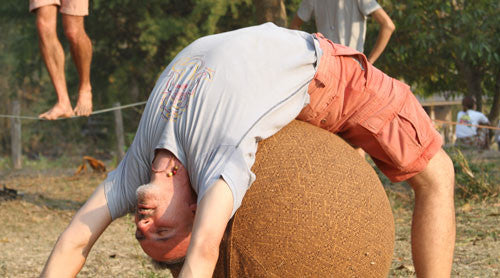
Yoga is a powerful part of our lives, and has been for many years. Between attending thousands of classes, teaching classes, attending festivals and workshops, and providing yoga products to hundreds of customers, it’s become ingrained in our thinking and way of life.
To boil yoga down to a simple catch-phrase is extremely difficult. There are so many different types of practices and flows, and it tends to mean something different to every yogi. But most of us would agree that a central tenet of any yoga practice is that mind, body and spirit are one, and that improving one aspect means improving all three. Yoga is a vessel for improving the way we function, both out in the world and in our quiet, private moments. It challenges the body, stretches the mind, and opens the spirit. It creates a channel for us to become better, more rounded people. We become more whole through our practice.
Yoga teaches us to be the best versions of ourselves, and to create a better flow in the world around us through our actions. It encourages us to think beyond ourselves, to try to understand the universe and our roles in it. Not only does it help us to reflect inwardly, but it makes us adapt the way we deal with other people. You can’t truly assimilate the revelations yoga brings you if you can’t apply them to other people. Yoga shows us that to grow, we must be more patient, kind and gracious with ourselves – and just as importantly, with others.
It’s at this point that yoga and Fair Trade truly intersect.

The aim of the Fair Trade movement is that we treat other people with the same respect and consideration that we apply to our own lives.
Like yoga’s approach to mind, body and spirit, Fair Trade’s core tenet is that production and consumption are two parts of the same whole. For consumption to be a positive force in the world, so too does the method of production.
Being conscientious about purchases – where they come from, who created them, and in what conditions – adds up to tangible, positive change in the lives of other people.
Yoga practitioners crave yoga products that have been produced in fair, ethical and safe environments, because they already understand honouring the spirit in others that is a reflection of the spirit in you – a true expression of ‘namaste’.
“As fair traders it is our responsibility to serve this niche community (14% of American women) who inherently share fair trade values. Engaging yogis in fair trade conversations and products can only grow and spread mindfulness into cross-sectoring markets.”
Yoga and Fair Trade beat with the same heart.
